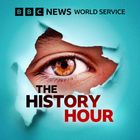
The History Hour
Dec 21, 2024
Max Pearson presents a collection of the week's Witness History interviews from the BBC World Service. Our guest is Professor Chandrika Kaul, a specialist on modern British and Imperial history at the University of St Andrews in the UK.
We start by hearing from both sides of Australia's 1999 referendum on becoming a republic.
Then, a survivor recounts the horrific 1972 Andes plane crash and the extraordinary things he had to do to survive.
We hear how the BBC put text on our television screens for the first time.
Plus, a grieving mother recounts the Taliban's horrific 2014 attack on a military school in Pakistan.
Finally, we hear how the communist authorities enforced martial law in Poland over Christmas in 1981.
Contributors:
Malcolm Turnbull - former Australian Prime Minister and leader of republican campaign. Professor David Flint - leader of Australians for Constitutional Monarchy. Nando Parrado - Andes plane crash survivor. Angus McIntyre - son of Colin McIntyre, Ceefax's first editor. Andaleeb Aftab - survivor of Pakistani military school attack. Maciek Romejko - Polish Solidarity member and activist
(Photo: Malcolm Turnbull, leader of the Australian Republican Movement, 1999. Credit: Torsten Blackwood/AFP via Getty Images)

